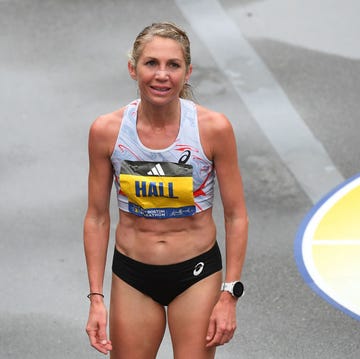It’s perhaps a sign of how far Evan Jager has come that he can do something no American man has ever done—win a world championships medal in the 3,000-meter steeplechase—and still be unhappy.
On Tuesday in London, the 28-year-old Illinois native (who now lives in Portland, Oregon) put his African rivals to the sword throughout the latter half of the men’s steeplechase final, but in the end he had to accept defeat as Olympic champion Conseslus Kipruto of Kenya came flying by to reign supreme again.
RELATED: What Happened Today at the World Track & Field Championships
“I’m a little disappointed I didn’t come away with the win but happy I stayed in the top three and got a medal,” Jager said afterward. “I’m a little bummed.”
For Jager, finding a way to win his first global title was something of a catch-22. Not gifted with the lightning speed of some of his rivals like Kipruto—who can run 400 meters in a blazing 47 seconds—his greatest strength is his engine, the ability to churn out a relentless pace lap after lap.
While that’s a strategy that has worked to good effect on the Diamond League circuit, the absence of pacemakers at championships such as this meant Jager was forced to take the reins himself.
The early pace was slow, the athletes virtually jogging through the first kilometer in 2:51.81, which left all 15 athletes bunched together. With just more than a mile to run, Jager finally broke, powering to the front and injecting a huge surge.
“I wanted to make it hard,” he said. “We thought it was going to go slow the first kilometer and we said if that happens it’s better for me to get rid of guys by going hard with three or four laps to go to make it a strength race.”
Over the next two laps, the athletes dropped like bowling pins behind and Jager unleashed his strike for home at the front, but when they approached the final 400 meters he still had unwanted company in the form of Kipruto and Morocco’s Soufiane El Bakkali.
ALSO: How To Watch the World Championships
Kipruto shot past with 300 meters to run, then Bakkali moved around, and for a moment it appeared as if Jager may not even medal, but he summoned all his strength over the final half lap to hold off the attack of France’s Mahiedine Mekhissi to take third in 8:15.53.
“I was like: Oh my gosh, I hope I have enough left,” Jager said, recalling his thoughts up the home stretch as he hung on for bronze.
Kipruto took gold in 8:14.12 ahead of El Bakkali to maintain Kenya’s stranglehold on the event, with Jager taking the first ever world medal in the event by an American.
“He’s just so good,” said Jager of the winner, who had struggled with injury for much of the year. “I feel like I did a pretty good job of running the sting out of his legs but I wasn’t surprised that he had that. Even being 90–95 percent I knew he’d be so tough to beat. I was really happy I could give him my best.”
Jager had been considered a bookies’ favorite for gold, which the stadium announcer reminded him of while standing on the start line, though he admitted afterward that he expected the championships to be a very different race to those on the circuit where he had looked unbeatable in recent weeks.
“I know they had me as a strong favorite and the betting lines were good for me, so I’m sorry if anybody lost money on me,” Jager said with a laugh. “I was glad to be in that position, maybe some guys were looking at me as the top dog, but Conseslus is just so good at championship races that I didn’t overlook him for a second. I knew he’d be tough.”
Looking ahead, though, Jager was adamant that in time he can rise to the top of the world, though he looked back with no regrets.
“We’ll keep working and figuring it out,” he said. “I’m definitely happy with how I ran it. I just wish I could have stuck it out for gold.”

Cathal Dennehy is a freelance writer based in Dublin, Ireland, who covers the sport for multiple outlets from Irish newspapers to international track websites. As an athlete, he was Irish junior cross-country champion and twice raced the European Cross Country, but since injury forced his retirement his best athletic feat has been the Irish beer mile record. He’s happiest when he’s running or writing stories about world-class athletes.












